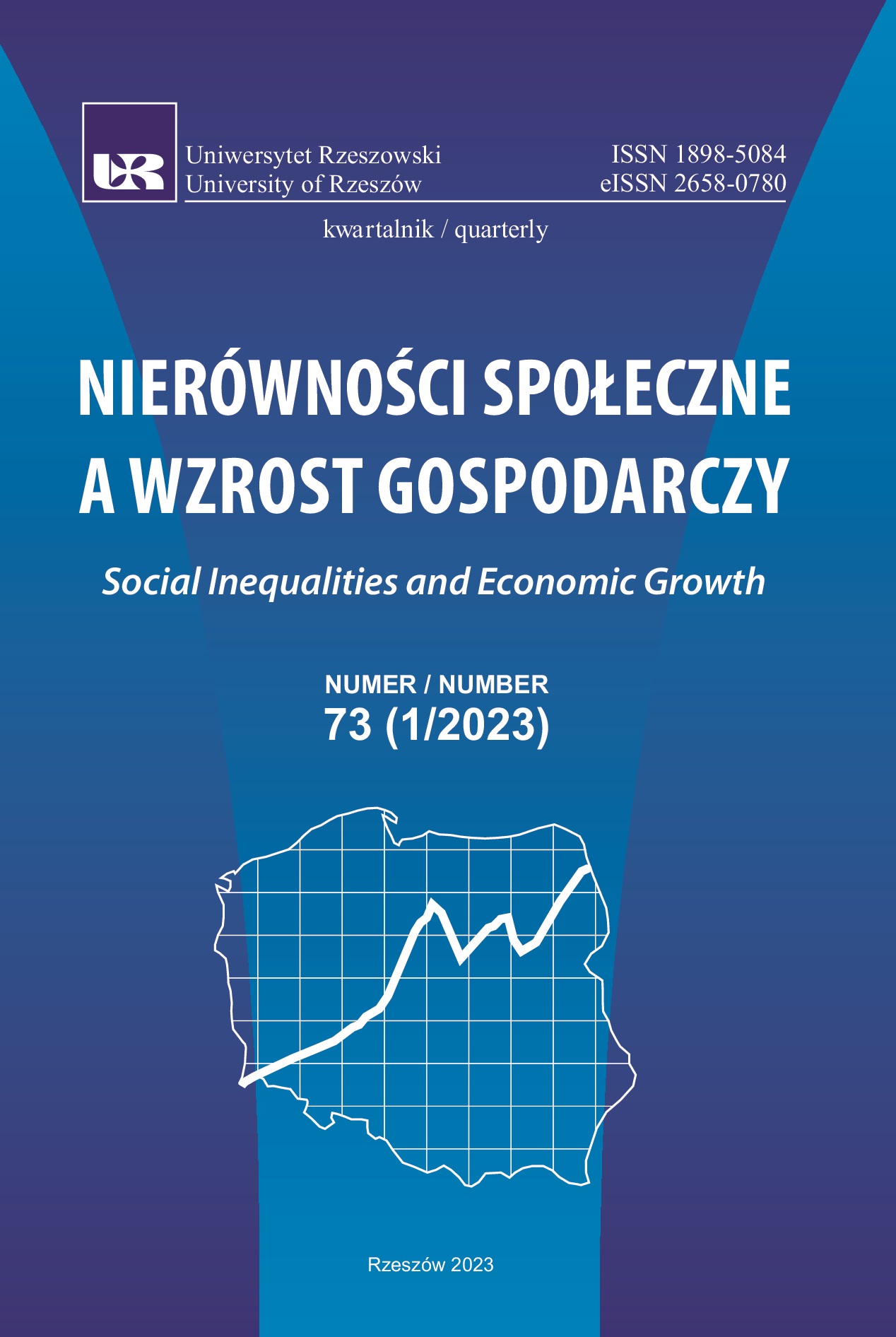Inequalities in health literacy – spatial and educational aspects
DOI:
https://doi.org/10.15584/nsawg.2023.1.5Keywords:
health literacy, inequality, youthAbstract
Health literacy is the ability of an individual to “read health” by accessing information and using it effectively to maintain good health. This is manifested by understanding the content provided in medical information, the ability to use medical services and then respecting the recommendations of professionals. However, there are numerous inequalities here. These inequalities are related both to the type of education (differences between students studying in different types of schools) and space, and not only between regions, but also within regions, i.e. between young people living in cities and those living in rural areas.
The aim of the article is to indicate the inequalities regarding the health literacy of adult learning youths in the Mazowieckie voivodeship, taking into account the type of education: general secondary schools, technical and industry schools, as well as the spatial arrangement (urban – rural) and the presentation of the diagnostic (research) survey: “Youth of Mazowsze”. The thesis of the study is the statement that inequalities in health behaviours depend on the type of education and on spatial differences. The study was carried out among young people studying in secondary schools in 2017/2018. The research tool here is the author’s questionnaire designed for the purpose of the research, to be used in an auditorium interview. Based on the study in the field of health literacy, it was assessed how the type of education affects the assessment of one’s own health and the awareness of the possibility of shaping it by one’s own behaviour, where individual selected behaviours were taken into account, and then the differentiation of these behaviours between the city and the countryside.
In the light of the “Youth of Mazowsze” study, one can observe among the respondents of the Mazowieckie Voivodship, especially from trade schools, a general, relatively lower assessment of their own health and health behaviours compared to the rest of the surveyed youth. However, there were no differences between the city and the countryside.
Downloads
References
Broucke, S., Fullam, J., Søresen, K., Pelikan, J.M, Röthlin, F., Ganahl, K., Słońska, Z. (2015). Health literacy in Europe: comparative results of the European health literacy survey (HLS-EU). Journal of Public Health, 25(6), 1053–1058. DOI: 10.1093/eurpub/ckv043.
Diaconu, K., Falconer, J., Vidal, N., O’May, F., Azasi, E., Elimian, K., Bou-Orm, I., Sarb, C., Witter, S., Ager, A. (2020). Fragility: implications for global health research and practice. Health Policy and Planning, 35(2), 235–243. DOI: 10.1093/heapol/czz142.
Dziankowska-Zaborszczyk, E., Ciabiada, B., Maniecka-Bryła, I. (2014). Samoocena stanu zdrowia jako predyktor umieralności przedwczesnej. Problemy Higieny i Epidemiologii, 95(4), 866–870.
European Commission Directorate General for Agriculture (DG VI). (1997). Rural Developments: CAP 2000. Working Document.
Floyd, R.L., Sobell, M., Velasquez, M., Ingersoll, K., Nettleman, M. (2007). Preventing alcohol-exposed pregnancies: A randomized controlled trial. American Journal of Preventive Medicine, 32, 1–8. DOI: 10.1016/j.amepre.2006.08.028.
Freedman, D.A., Bess, K.D., Tucker, H.A., Boyd, L., Tuchman, A.M., Wallston, K.A. (2009). Public health literacy, defined. American Journal Preventive Medicine, 36, 446-451. DOI: 10.1016/j.amepre.2009.02.001.
Juszczyk, G., Bogusławski, S., Wojtyniak, B. (2022). Diagnoza systemowa i plan obudowy zdrowotnej – redefinicja systemu profilaktyki i leczenia chorób Polaków. Wnioski z raportu. W: B. Wojtyniak, P. Goryński (red.), Diagnoza stanu zdrowia Polaków: Raport PZH – Sytuacja zdrowotna ludności Polski i jej uwarunkowania (s. 38–39). Warszawa: Narodowy Instytut Zdrowia Publicznego – Państwowy Zakład Higieny.
Kemm, J., Close, A. (1995). Health promotion. Theory and practice. London: McMillian.
Kickbusch, I., Pelikan, J.M.F., Apfel, A.D., Tsouros, A.D. (2013). Health literacy. The solid facts. WHO. Regional Office for Europe.
Matsuyama, R.K., Wilson-Genderson, M., Kuhn, L., Moghanaki, D., Vachhani, H., Paasche-Orlow, M. (2011). Education level, not health literacy, associated with information needs for patients with cancer. Patient Education and Counseling, 85(3), 229–236. DOI: 10.1016/j.pec.2011.03.022.
Mayer, G., Villaire, M. (2011). Health literacy: An opportunity of nurses to lead by an example. Nursing Outlook, 59(2), 59–60. DOI: 10.1016/j.outlook.2011.01.006.
Nutbeam, D., (2000). Health literacy as a public health goal: a challenge for contemporary health education and communication strategies into the 21st century. Health Promotion International, 15(3), 259–267. DOI: 10.1093/heapro/15.3.259.
Piketty, T. (2022). Kapitał i ideologia (przekład B. Geppert). Warszawa: Wydawnictwo Krytyki Politycznej.
Polacy o swoim zdrowiu oraz prozdrowotnych zachowaniach i aktywnościach. (2012). Komunikat z badań. Warszawa: CEBOS.
Reckers-Droog, V., Jansen, M., Bijlmakers, L., Baltussen, R., Brouwer, W., Exel, J. (2020). How does participating in a deliberative citizens panel on healthcare priority setting influence the views of participants? Health Policy, 124(2), 143–151. DOI: 10.1016/j.healthpol.2019.11.011.
Stiglitz, J.E. (2015). Cena nierówności. W jaki sposób dzisiejsze podziały społeczne zagrażają naszej przyszłości? Warszawa: Wydawnictwo Krytyki Literackiej.
WHO. Behavioural and cultural insights. Health Literacy. Pobrane z: https://www.who.int/europe/teams/behavioural-and-cultural-insights/health-literacy (2022.08.23).
Wolf, M., Gazmararian, J., Baker, D. (2007). Health literacy and health risk behaviors among older adults. American Journal of Preventive Medicine, 32(1), 19–24. DOI: 10.1016/j.amepre.2006.08.024.
Zarcadoolas, C., Plasant, A., Greer, D.S. (2005). Understanding health literacy: an expanded model. Health Promotion International, 20(2), 195–203. DOI: 10.1093/heapro/dah609.
Downloads
Published
How to Cite
Issue
Section
License
Copyright (c) 2023 University of Rzeszow

This work is licensed under a Creative Commons Attribution-ShareAlike 4.0 International License.


